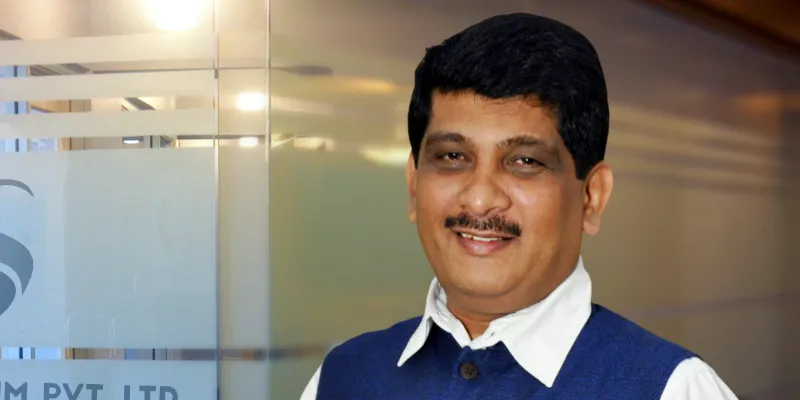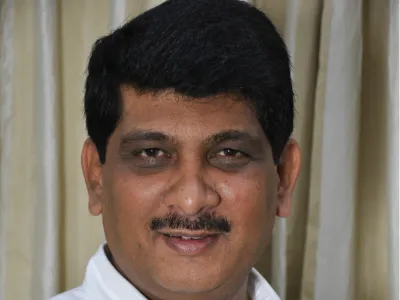How this AC repairman turned millionaire entrepreneur
The notion that hard work can accomplish anything seems a bit too clichéd today. Because our ambitions are shackled to bandwagons; our strategies in the cloud, hence, our brand value in the air; our traction calculated in "impressions" rather than relations.
However, the story of Sachin Shinde, a former Bhaba Atomic Research Centre (BARC) repairman who, as a child, survived on 20 paise a day, is an invigorating dose of honesty and humility. He fondly recalls how he erected a million dollar enterprise brick by brick through age-old principles of business, for YourStory.

20 paise...
48-year-old Sachin Shinde was born to a mill worker and a homemaker. Residing in a small room in Worli’s BDD Chawl, he grew up on an allowance of 20 paise, and memories of being down to the last penny were hard-wired into the part of his brain that would later simulate his strongest motivations. “At that time, the bus ticket itself cost us 20 paise. So, I would give my share to my sister for a bus ticket and walk to school. These incidents left their impact on me. It was then that I decided to grow up not as a service man, but as a businessman,” says Sachin.
But it was a while before his plans began to bear fruit. He started out as an intern first at Bluestar and then later at BARC, where he would train for two years before going on to serve them for a full decade.
Sachin started at the bottom, in technical service design, where he worked as a technical supervisor. His work entailed the maintenance of all the devices, like ACs and refrigerators, within BARC. “I was really fond of my job. In fact, I helped all the ground staff – what people call peons and sweepers - study and appear for the PWD exams, so that they could succeed in life. They were also later selected in technical service,” he recalls.
20,000 rupees...
There were three incidents that would go on to become the stepping stones for Sachin’s professional growth. The first - a Mumbai bandh, when the AC in the car of the director of BARC, Mr Chidambaram, had broken down. It was a government vehicle, and according to BARC rules, such repair work had to be given to outside vendors, but the bandh meant that all workers were unavailable. Sachin was called on to do the task – something that all of his seniors opposed fearing that their department would be in jeopardy in case of any errors committed on the job.
“I took the risk and did it successfully, after which they stopped giving their work to external vendors and took an executive decision that they should utilise the talent they already had internally, within their team, for work like this,” he recalls. Sachin, thus, not only spearheaded this new avenue of work, but also found a spot in the express line of the promotion queue.
A lot of officers started recognising him and his work. Within two years, he received the kind of raises that people normally got after three. “In 1999, my salary was Rs 20,000 a month, which was enough for me. But what got to me was the routine. Neither was there anything challenging about my job nor was I doing anything extraordinary with my life,” he recalls.
He did not want to wind up like his colleague, another technical supervisor at BARC, who had worked there for 40 years. After staying in a massive four-room flat given by the company, he was made to vacate the flat the very day he retired, given Rs 15 lakh in PF, and had to take a loan to be able to afford a small 240 sqft apartment. “I saw his condition and started calculating. The most I would earn and retain after taxes even after 40 years of service – my entire life almost - was barely Rs 2 crore, the value of which will be nothing 20 years from now,” he says, adding that the dread from his childhood crept in again, of not living fully and freely, in want of money.

Back to 10,000...
He sensed that the time to realise his long-time dream - to take the plunge into entrepreneurship - had come. His family, part of a long lineage of servicemen, naturally thought that this was a terrifying prospect – leaving a job with the central government was a direct invitation to his doom, in everyone’s opinion. “My mother didn’t speak to me for four entire months – she questioned my intentions. I told her that I wanted a life where my money keeps coming in even when I am sleeping,” he says.
All Sachin had, though, was experience. But, as it turns out, his experience was an appreciating asset that duly bore returns. He decided to start a business in the area he knew best, setting up SPAN SPECTRUM, an authorised service provider for Blue Star Ltd for its annual maintenance of air conditioners, water coolers, deep freezers, bottle dispensers and cold rooms.
He gathered Rs 10,000 from his friends and family for starting up and decided to meet all other expenditures from the revenues he earned.
Soon, Sachin stumbled upon his first hack – acting successful early on to actually, someday, become successful. “In my sector, everybody mostly operated from home, but I took up an office and built infrastructure to keep up appearances, with systematic computerisation, entries, technology like fax machines and so on,” he explains.
They had no direct clients at first. This was when another incident from his past came to his rescue. Having fixed a senior director’s AC when he was interning at BlueStar in 1990 during a worker strike, the grateful director went on to maintain relations with him long after Sachin moved on to BARC.
So, when Sachin was framing a business plan, he got back in touch with the director, now a vice president, who referred Sachin to an officer, a PM Desai, to hook him up with their clients. Ironically, Desai, in turn, kept Sachin on the hook for three years without giving him any leads. “Everyone asked me to give up on him, but I kept persisting,” says the optimist. And it paid off!
Finally, a WHO and UNICEF medical and vaccination camp across several villages in Maharashtra required help in servicing all of their refrigerators, which Blue Star, their regular contractor, couldn’t deliver on due to the short notice. They needed a company to go from village to village to look at the fridges, and Desai asked Sachin if Span could step in. “I took it on and completed it in very limited time. In those few months, I was on the road more than I was at home. I even travelled to Naxalite-infested areas like Gadhchiroli, where even the state transport buses wouldn’t go. But with this assignment, a relationship was built with Blue Star that is still strong even 23 years hence,” says Sachin.
On a trajectory to Rs 20 crore
His connection with Blue Star also gave his brand image a boost, and soon, SPAN SPECTRUM was working with big names like Godrej, LG, Videocon and Hitachi as well. For the first five years, Span had no direct clients, and only provided service and maintenance for the buyers of the above-mentioned companies. In those same five years, the company put turnovers of Rs 5 crore on the scoreboard.
But, as the saying goes, tragedy strikes when you least expect it. Span lost Godrej, which contributed 70 percent of their revenues, as a client, because of a small error committed by one of its personnel. “I was thoroughly disturbed – the word on the street was that Sachin Shinde and his company would shut shop soon,” he recalls.
It took him a lot of extra capital infusion to set things right, not to mention help from Blue Star to survive that year and regain people’s confidence. Part of the damage control involved refurbishing his strategies.
It was around 2006 that Sachin laid out a plan to target the kind of companies that had a separate fund in their budget for work in his sector. “I thought I could act as a support function for such companies. A little bit of research also led me to the knowledge that FMCG was a great space to enter. For example, cold drinks manufacturers will always sustain because the demand for such goods will never go down. Now, these companies provide a Visi-cooler to their distributors and retailers to keep these bottles cool. So, I approached Coco-Cola by 2007, and first got the contract for their Mumbai region’s cooler refurbishment and asset management. And that was my gateway into the larger space,” he lets on.
Very soon, he even took on the chocolates space, and shook hands with giants like Cadbury for their manufacturing as well as retail cooling requirements. In fact, he was even an advisor to the Cadbury executives, who sought his guidance on various decisions like bringing in more transparent point-of-purchase Visi-coolers to lure more customers and placing coolers that doubled up as vending machines in villages, all of which made him a prized business associate for his partners.
Loose ends and life lessons
The third milestone in his journey was after he had regained his market position, when Godrej returned to them seeking reconciliation, saying, “We weren’t organised before. You had shortcomings, and so did we. Let’s put the past behind us and partner up again.” But Sachin refused. “I thought to myself, ‘They didn’t stay with me during my tough times, and only came to me because I am successful now. I haven’t changed; I am the same person I was back then. Only my circumstances have changed. If someone will change their word based on my circumstances, maybe they are not worth keeping around.’ So, I very politely refused the offer, but Godrej did realise that they should try and maintain relations with my company,” he says.
By working harder than ever, Sachin took the turnover up to Rs 5 crore in the next five years, and to Rs 20 crore in the five after that. “We now aim to touch the hundred crore mark in the next five years,” he reveals.
But he still feels that he has done nothing extraordinary and that this success is for everyone to grab if they stay rooted to some simple principles. “Stay put in the market. Don’t ever get intimidated. Trust your team and partners. Always give them responsibilities and make them feel worthy. Understand their problems and help them through crises,” he says.
Sachin sums things up with this extraordinary thought – “Don’t think about where you came from; focus on where you are going.”







